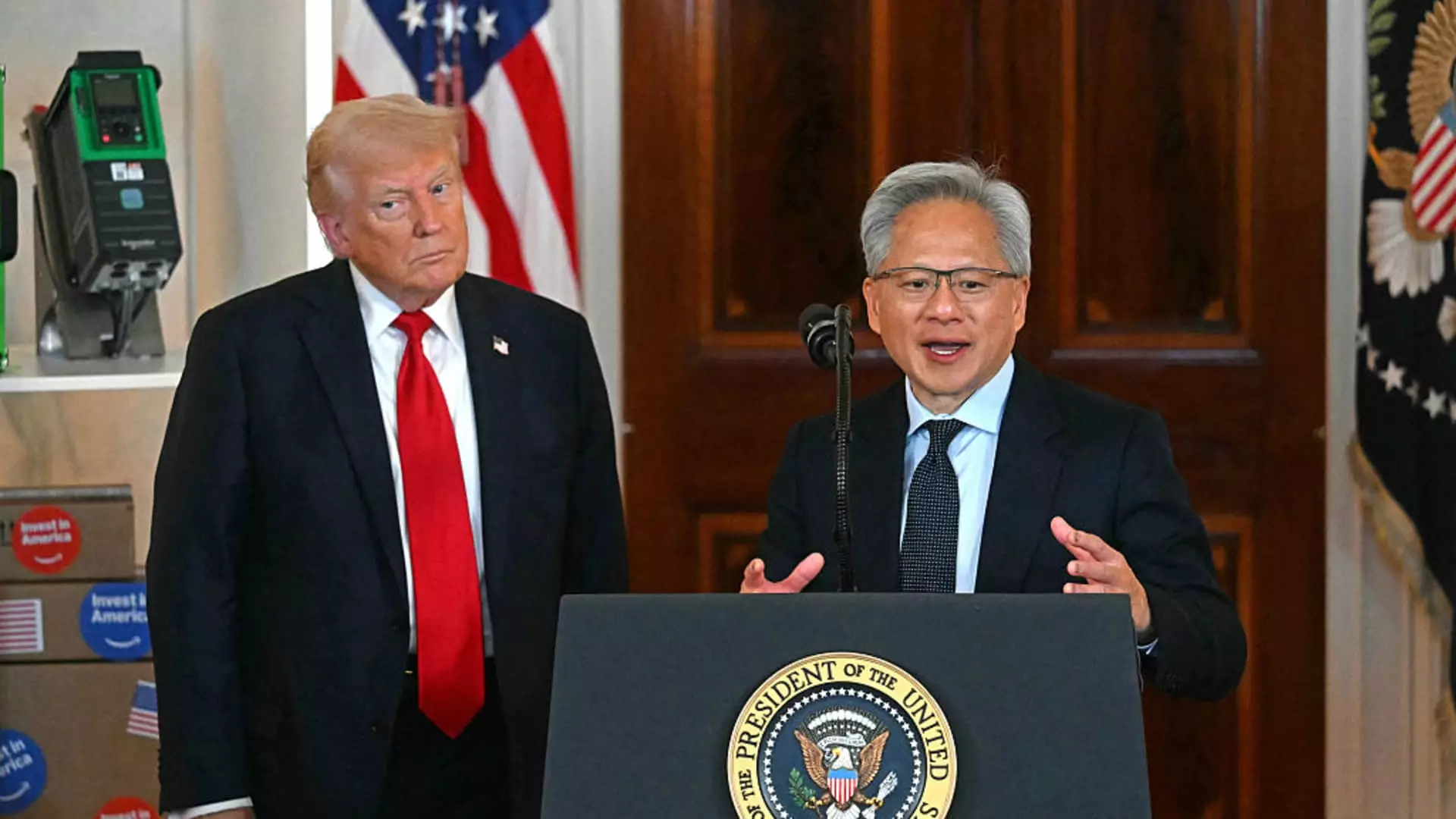In an era where technological dominance defines national power, the recent decision by President Donald Trump to allow American semiconductor giants Nvidia and AMD to sell AI chips to China in exchange for a cut of revenue signals a dangerous shift. While the deal might appear lucrative at first glance, it threatens to erode the very foundation of America’s strategic advantage. This isn’t just a simple business arrangement; it’s an open invitation to compromise the nation’s security and future innovation, all in the pursuit of immediate financial gain.
The offer for Nvidia and AMD to pay 15% of their revenues from Chinese sales to the U.S. government seems at odds with the fundamental principles of national security. Historically, America has maintained its edge by carefully controlling access to critical technologies, especially those with military and strategic applications. To entertain the idea of monetizing access to advanced AI chips—chips that could potentially enhance China’s military capabilities—weakens that advantage. It’s akin to trading a piece of the kingdom’s armor for a temporary gold coin, neglecting the long-term consequences for short-term profit.
Furthermore, this arrangement signals a troubling willingness to compromise the integrity of America’s tech leadership. The argument that these chips do not bolster Chinese military systems is, at best, speculative. The possibility that advanced AI hardware like Nvidia’s H20 and AMD’s MI308 could be repurposed or adapted for military use is not far-fetched. Once the technology leaves American shores, controlling its application becomes exponentially more difficult. The risk isn’t just theoretical; it’s a clear erosion of the strategic firewall that has kept America safe and innovative for decades.
Politicizing Economic Decisions with National Security at the Crossroads
The open letter from six Senate Democrats underscores a vital point—economic decisions should never be divorced from their implications for national security. Their warning that the deal could inadvertently help strengthen China’s military systems is not alarmist but prudent. The Biden administration, and more so the Trump administration that preceded it, face a core challenge: balancing economic engagement with strategic defense considerations.
Selling critical AI chips—some of the most powerful tools in the modern military arena—without stringent safeguards is a gamble that America cannot afford. It’s a reckless gamble that undermines the investments made over decades in research, talent, and infrastructure. The refusal by China to welcome Nvidia’s return with open arms serves as a stark reminder: the Chinese leadership recognizes the strategic importance of this technology. They understand that even the appearance of capitulation by U.S. companies can embolden their ambitions.
The critics’ call for transparency and for the reversal of these agreements is well-founded. It reflects a broader skepticism about how the U.S. government has approached technological sovereignty. This isn’t just about protecting markets; it’s about safeguarding the innovation edge that has historically been the distinguishing mark of American economic and military power. Selling technology at a discount—especially to a strategic adversary—undermines that edge and could set a precedent for future concessions.
The Reckless Appeal to Profit Hurts America’s Innovative Spirit
The response from Nvidia highlighting that their chips do not affect military capabilities is a red herring. It ignores the reality that technology can be dual-use, and once the technology leaves U.S. borders, the control diminishes. The false comfort that these chips are purely civilian-grade overlooks the intricate web of national security risks.
The implications are profound: by prioritizing short-term revenue over strategic advantage, American companies and policymakers risk sacrificing the nation’s future. An innovation-driven economy cannot thrive if it routinely trades away its cutting edge for immediate dollars. The world is watching, and China—along with other potential adversaries—may interpret this as a weakness, emboldening their own technological aspirations.
In essence, this deal exemplifies a fundamental failure of leadership—a willingness to endanger America’s future for fleeting financial benefits. Such decisions represent a slip into transactional thinking that forgets the importance of sovereignty and the necessity of maintaining technological superiority. As public and political debates unfold, one must ask: what is the true cost of this short-sighted compromise?
Only by critically assessing and resisting these temptations can America preserve the innovative spirit that has historically kept it at the forefront of global power. Sacrificing that legacy in exchange for easy revenue is a perilous path—one that threatens to undermine the nation’s security and economic vitality well into the future.

